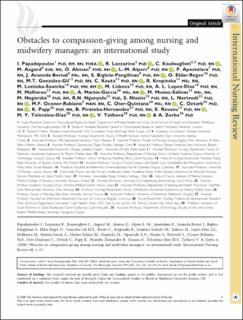| dc.contributor.author | Papadopoulos, Irena | |
| dc.contributor.author | Lazzarino, R. | |
| dc.contributor.author | Koulouglioti, Christina | |
| dc.contributor.author | Aagard, Magdeline | |
| dc.contributor.author | Akman, ö. | |
| dc.contributor.author | Alpers, Lise-Merete | |
| dc.date.accessioned | 2020-08-17T06:44:20Z | |
| dc.date.available | 2020-08-17T06:44:20Z | |
| dc.date.created | 2020-08-14T10:04:47Z | |
| dc.date.issued | 2020 | |
| dc.identifier.citation | International Nursing Review. 2020, 1-13. | en_US |
| dc.identifier.issn | 0020-8132 | |
| dc.identifier.uri | https://hdl.handle.net/11250/2672555 | |
| dc.description | This is an open access article under the terms of the Creative Commons Attribution License, which permits use, distribution and reproduction in any medium, provided the original work is properly cited. | en_US |
| dc.description.abstract | Aim
To explore nursing and midwifery managers’ views regarding obstacles to compassion‐giving across country cultures.
Background
The benefit of compassionate leadership is being advocated, but despite the fact that health care is invariably conducted within culturally diverse workplaces, the interconnection of culture, compassion and leadership is rarely addressed. Furthermore, evidence on how cultural factors hinder the expression of compassion among nursing and midwifery managers is lacking.
Methods
Cross‐sectional, exploratory, international online survey involving 1 217 participants from 17 countries. Managers’ responses on open‐ended questions related to barriers for providing compassion were entered and thematically analysed through NVivo.
Results
Three key themes related to compassion‐giving obstacles emerged across countries: 1. related to the managers’ personal characteristics and experiences; 2. system‐related; and 3. staff‐related.
Conclusions
Obstacles to compassion‐giving among managers vary across countries. An understanding of the variations across countries and cultures of what impedes compassion to flourish in health care is important.
Implications for nursing practice and policy
Nursing mangers should wisely use their power by adopting leadership styles that promote culturally competent and compassionate workplaces with respect for human rights. Policymakers should identify training and mentoring needs to enable the development of managers’ practical wisdom. Appropriate national and international policies should facilitate the establishment of standards and guidelines for compassionate leadership, in the face of distorted organizational cultures and system‐related obstacles to compassion‐giving. | en_US |
| dc.language.iso | eng | en_US |
| dc.relation.uri | https://onlinelibrary.wiley.com/doi/full/10.1111/inr.12611 | |
| dc.rights | Navngivelse 4.0 Internasjonal | * |
| dc.rights.uri | http://creativecommons.org/licenses/by/4.0/deed.no | * |
| dc.title | Obstacles to compassion‐giving among nursing and midwifery managers: an international study | en_US |
| dc.type | Peer reviewed | en_US |
| dc.type | Journal article | en_US |
| dc.description.version | publishedVersion | en_US |
| dc.rights.holder | 2020 The Author(s) | en_US |
| dc.source.pagenumber | 1-13 | en_US |
| dc.source.journal | International Nursing Review | en_US |
| dc.identifier.doi | 10.1111/inr.12611 | |
| dc.identifier.cristin | 1823288 | |
| cristin.ispublished | true | |
| cristin.fulltext | original | |
| cristin.qualitycode | 1 | |

